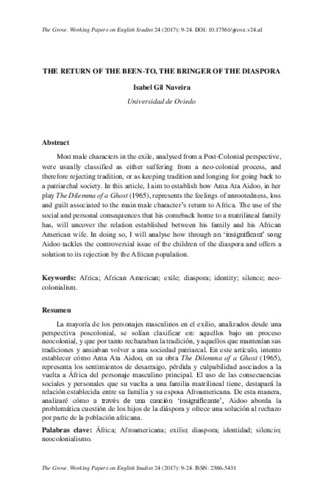The Return of the Been-to, the Bringer of the Diaspora
Autor(es) y otros:
Palabra(s) clave:
Africa
African American
Exile
Diaspora
Identity
Silence
Neo-colonialism
Fecha de publicación:
Versión del editor:
Citación:
Descripción física:
Resumen:
Most male characters in the exile, analysed from a Post-Colonial perspective, were usually classified as either suffering from a neo-colonial process, and therefore rejecting tradition, or as keeping tradition and longing for going back to a patriarchal society. In this article, I aim to establish how Ama Ata Aidoo, in her play The Dilemma of a Ghost (1964), represents the feelings of unrootedness, loss and guilt associated to the main male character’s return to Africa. The use of the social and personal consequences that his comeback home to a matrilineal family has, will uncover the relation established between his family and his African American wife. In doing so, I will analyse how through an ‘insignificant’ song Aidoo tackles the controversial issue of the children of the diaspora and offers a solution to its rejection by the African population.
Most male characters in the exile, analysed from a Post-Colonial perspective, were usually classified as either suffering from a neo-colonial process, and therefore rejecting tradition, or as keeping tradition and longing for going back to a patriarchal society. In this article, I aim to establish how Ama Ata Aidoo, in her play The Dilemma of a Ghost (1964), represents the feelings of unrootedness, loss and guilt associated to the main male character’s return to Africa. The use of the social and personal consequences that his comeback home to a matrilineal family has, will uncover the relation established between his family and his African American wife. In doing so, I will analyse how through an ‘insignificant’ song Aidoo tackles the controversial issue of the children of the diaspora and offers a solution to its rejection by the African population.
Colecciones
- Artículos [37354]
- Filología Inglesa, Francesa y Alemana [579]
Ficheros en el ítem





